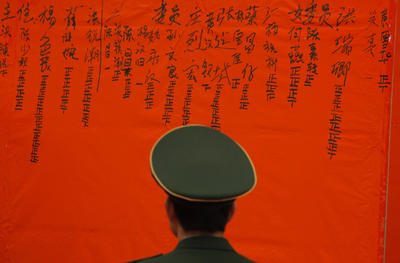The village is beyond the government’s sanctioned institutional establishment, which stops at the town and township level. However, the Party retains strong influence over village deliberations and politics through village party committees.
With Deng Xiaoping, Peng Zhen and other reformers at the helm, the law underwent a ‘tug-of-war’ with conservatives through the 1980s before finally seeing the light of day. As China opened up and marketisation surged ahead, the former three-tier institutional structure — team, brigade and commune — proved untenable for meeting the needs of rural society in the face of rapid economic and socio-political changes. Corruption, administrative malfeasance and cadre’s exaction and arbitrariness aggravated relations between cadres and the wider population.
Following the 1989 Tiananmen incident, the implementation of village elections, although momentarily stalled, proved a strategic move by the Chinese Communist Party (CCP) in assuaging the damage to the regime’s legitimacy. The ‘creeping’ democratisation that began at the grassroots level was never a policy response to the demands of the general populace at the local level. It was an attempt by the party-state to rein in control on rural society — where the majority of the population still resided, in the 1990s, in over one million villages — given its inevitable retreat due to gradual marketisation.
The initial phase of elections in the early 1990s was unsatisfactory in terms of democratic criteria: nomination and the process of electing local cadres. There was strong resistance to organic law by the Organisation Department of the CCP and local town and village (party) cadres. Rigged elections were common as cadres feared losing power and authority to those elected with a mandate to fight for villagers’ rights and welfare. Elected officials, who did not belong to the power structure of the CCP, may not have listened to the dictate of higher-level authority, namely the town/township government or party branch, in implementing unpopular state policies, such as birth control and tax collection.
Mid-level officials in the Ministry of Civil Affairs (MoCA), however, adopted a two-pronged approach to implementing elections. First, they pushed for elections to be implemented, regardless of imperfections, and then later fine-tuned them to meet democratic criteria and procedures. Meanwhile, with the support of reformers at the centre, MoCA officials were able to work with international organisations, including the Ford Foundation and the Carter Center, to learn more about holding democratic elections. Foreign dignitaries and researchers were also arranged to visit China’s show-case village election sites.
After 10 years of implementation, the organic law on village elections was revised and made permanent in November 1998. Elections were made mandatory in Chinese villages every three years and villagers’ committees (VC) of three to seven members were set up throughout the country with a VC director, deputy director and members.
Although implementing elections has generally been successful, some problems have also emerged. Irregularities in elections such vote-buying and bribery are common. In some villages, rich men, triad (secret societies) members or individuals strong lineage or clan predominate over elections and village committees. Rural protests over issues such as land sales and compensation from cadres and petitions to the central government in Beijing are still rampant, as corruption and the arbitrariness of local cadres remain serious problems in an era of reform. There is no definite conclusion on the extent to which grassroots democratisation has brought about better governance, despite revisions made to the organic law to improve the ‘technical’ aspects of VC management.
Yet, some studies show spillover effects from implementing the organic law. Villagers developed a more rights-conscious mentality as they have used the law in defence of their interests, and in defiance of local predatory state and authoritarian or recalcitrant cadres to challenge arbitrary rules and violations of villagers’ rights to free and fair election, land sale or usage and welfare.
Elites in the central government have openly stated their objections to Western style liberal democracy. In the 1990s, some experiments with local elections at the town/township level were halted by the central authorities and pronounced as unconstitutional. By early 2000, the prospect of a linear progression to democracy had evaporated.
Since the Jiang Zemin era, the principle of yijiantiao— the holding of concurrent appointment by the village party branch secretary — has become the norm in Chinese villages. The organic law formally affirmed and declared the dominant role of the village party secretary and party branch as the core leadership institution in rural society. VCs are thus mostly led by the village party secretary, who is also likely to be the elected leader.
Pro-democracy protests — with public assemblies in over a dozen Chinese cities — in early 2011 were inspired by and named after the Jasmine Revolution in Tunisia. The Chinese government took swift action in dealing with the protesters. Shortly afterward, the collaboration between MoCA and the Carter Center on election watch and exchange was also halted.
The Chinese government is fully aware of the implications of colour revolution and liberal ideology which could be anathema to its continual rule. For the moment, electoral participation in village elections serves the clear purpose to improve village governance. And democracy is seen as a means for better economic development and stability.
The autonomy of village self-rule is granted, but within the parameters of party-state control. The Organic Law of Villagers’ Committees serves as a means for the party state to consolidate its rule and control over rural society. Villagers are ‘brought in’ to keep an eye on local cadres who fail to meet public and central government expectations — seemingly, the nascent process of democratisation in rural China has come to a standstill.
Bryan Ho is an Assistant Professor in the Department of Government & Public Administration, Faculty of Social Sciences, University of Macau.

